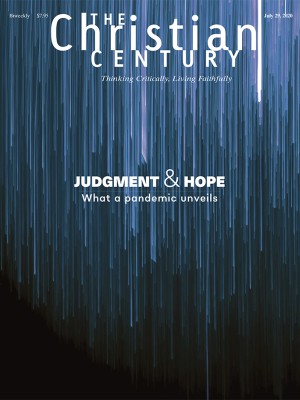Maybe this really is a time of divine judgment
Amid pandemic and protest, will we turn to each other and live?

As the United States sank into its halfhearted quarantine this spring, we all seemed to turn at once to framework building and normalcy preserving. Social media feeds swelled with color-coded schedules for children suddenly home from school, advice for those working from home and the laid off alike, and a thousand options for joining in what had been group activities—workouts, meditation, worship, prayer—from the relative safety of our living rooms. And with this tide of what-we-talk-about-when-we-don’t-talk-about-COVID-19 came salvos by big names published in big outlets, including N. T. Wright in Time and James Martin in the New York Times, about how a Christian ought to respond to a pandemic.
This pandemic has brought with it a great deal about which we might desire some clarity and for which Christianity, the most powerful religion in the country and the one most nonreligious people are likely to no longer believe, might be asked to answer: more than 100,000 Americans dead and more dying; death dealt not evenly but along the familiar lines of race and income; hospitals, emergency medical services, morgues, and funeral homes stretched well past the breaking point; triage protocols that determine who dies and who gets a shot at living; millions out of work with hunger and eviction looming; half a million people with no homes in which to shelter in place. It’s a disaster.
Read our latest issue or browse back issues.
And Wright and Martin indeed offered faithful responses to disaster. Martin reminded us that we cannot answer the question “why” but can follow Jesus, while Wright said that beyond pat answers lies the biblical tradition of lament. Both were right to observe that in the face of catastrophe, neatness and simplicity are at best red herrings.
Then, 12 weeks after we first settled in, we exploded: days and nights of protests, marches, damage to property, chants, downed statues, arrests, tear gas, and rubber-coated bullets, as thousands of people took to the streets in outrage at the killing of yet more unarmed black Americans by police. The same debates we have had in the wake of the killing of other black people—where do good protests end and bad ones begin? what of property? how should a police force respond?—are taking place again. The catastrophe has been compounded. Are lament and open wondering the best Christians have to offer?
Martin, like many, rejects any ideas of divine testing or punishment—they “make God out to be a monster.” Wright sees divine punishment or any other explanation as a “knee-jerk” reaction from a culture suffering from the rationalist demand to explain everything. (In fact, divine judgment and punishment for sin were first-line explanations for Christians centuries before the rise of rationalism.) Yet in the same gesture with which they reached to leave open uncertainty and invite truthful emotional response, both writers neatly and simply shut the door on the elephant in the room: the question of divine judgment. There is much to explore, much to wonder about, and much to lament in a disaster—but it seems one must not for a moment think that God had anything to do with it.
I would like—carefully, with fear and trembling—to face the elephant. God knows that judgment has been used both clumsily and callously, as poor comfort and as a cudgel, and that no one should rush to declare the judgment of God without full knowledge that they will come under that judgment as well. Martin and others have rightly noted that in John’s account of the man born blind and Luke’s of those killed by the collapsing tower of Siloam, Jesus thoroughly troubles any sense of correspondence between individual sin and individual calamity. But to say that judgment is entirely canceled, as it were, is to misread the texts. Both stories scrap punishment, but judgment remains: the inexorable outworking of what has been happening all along.
The self-preserving cruelty of the community leaders who drive out the healed man is, along with that man’s faith, itself the judgment for which Jesus tells the man he came into the world, namely, “that those who do not see may see, and those who do see may become blind.” And to those who wonder whether the tower fell where it did because those people were especially bad, Jesus says, essentially, Look to yourself: they weren’t worse than anyone else, and such a fate may well await you. To the damaged image of God in us just judgment holds up a mirror.
Jesus takes away the folly of a straight line between a sin and its punishment. But what we have instead is the truth that, should God judge, we would be liable to it. “I do not judge,” Jesus tells his critics, “yet even if I do judge, my judgment is valid.” This is a sticking point for many, especially those of us Christians who eschew the image of a primarily wrathful God never more than a breath away from consigning the lot of us to the flames of hell. If we have rejected God as smiter, why would we accept God as judge? Original sin is out of fashion, and most of us are doing the best we can.
But over this twofold objection—God doesn’t do that, and if God did, we wouldn’t deserve it—must come the cries of the suffering. “Am I my brother’s keeper?” asks one of the first humans, and the whole Bible proceeds to answer yes. Yet we—and by “we” I mean especially white Christians—are little more willing now to accept our deep and abiding responsibility for the well-being of other people, how profoundly we are bound up together, than Cain was.
We care, of course—but responsibility is not reducible to care. This is important and easy to miss. Many of us care very much about other people, even and especially the vulnerable and suffering, who are especially dear to God. But the notion that we bear real responsibility for others’ states, that their suffering can meaningfully redound to our guilt, runs so counter to our culture’s emphasis on individual responsibility for individual outcomes that even recognition of systemic causes often stops short of recognition of shared accountability for systemic effects.
Yet the Bible takes this bound-up-ness as a matter of course. Jesus mourns over Jerusalem as a whole without sifting out who, precisely, has stoned the ones sent to it and refused to be gathered under his wings. Isaiah declares God’s refusal of the offerings of a people who oppress workers, who quarrel and fight, without giving a roll call of who is guilty and who is not. God has counted every hair on each of our heads, but living is still a group project. Scripture provides little warrant for the comfortable among us to believe that we will not be called to account for the hardship and distress of others. And rare indeed these days is the comfort that does not come at someone else’s cost.
“This is the judgment,” says John 3, “that the light has come into the world, and people loved darkness rather than light because their deeds were evil.” The judgment is that, given the option, people go with what they have already been going with. That given the option, we choose not to see. That, given the option, we build towers that will fall. That, given the option, we do not wish to be made well, and so are not.
We have all seen the calls to let a certain portion of the population die for the sake of the economy, our favorite god. We have seen calls for war with another country on which we wish to pin the blame for the many thousands who have died in our undersupplied hospitals, who have been stacked in refrigerated trucks waiting to be buried wherever there is space, without family to mourn them. We have seen more and better-articulated horror at the sight of a burning police precinct building or the shattered storefronts of chain stores than at the records of police brutality against unarmed people or the redlining legacy that forms the neighborhoods where we now live, “safe” because of the unsafety of others.
The COVID-19 pandemic and the cell phone cameras of ordinary people have brutally illuminated the shambles we call a society—and the strong national preference, as expressed by our leaders, has been to cut the lights, bring in the troops, call evil good and good evil, and resuscitate the Dow. Certainly many of us disagree, yes. But disagreement does not opt us out of our connection with others.
COVID-19 deaths and death at the hands of police are not judgments on those who die. This we know. But to fail or to refuse to see both the pandemic’s shape and the glass in the streets of every major US city as judgment on the nation we have been building for 400 years and on the ways this nation has shaped the world is to lose the chance to repent for our most constant sin: our ethos has always considered some human lives—indigenous, enslaved, black, brown, poor, sick—expendable. Each preventable death is precious in the sight of God and accrues to the guilt of those of us who are shielded by our race and our class from the harm built into our way of life.
This is judgment as literal apocalypse: exposure of how thoroughly sin structures all we know. The light has come into the world, but we have preferred darkness.
Of course there is grace to be found. Every town has its mutual aid society, every sewer his or her pile of masks. School systems are working to feed students. Demands that would have been dismissed as utopian only a month ago, like defunding police forces and completely reimagining community safety, have found surprising political traction. Christ has risen; there is still welcome for the sinner and more graces for the good, as the hymn goes.
But still, our most essential workers are paid the least and protected little if at all. All 50 states are in some stage of reopening, even as COVID-19 case numbers rise. The police who shot Breonna Taylor in her bed cannot be fired until the investigation is complete—an investigation that was not ordered for more than two months after her death. And on, and on, and on. For those with eyes to see, the judgment is clear. The greatest mercy is being given this chance to turn from it, to turn toward each other, and live.
A version of this article appears in the print edition under the title “A time of judgment.”





